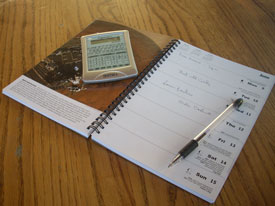Why is Time Management Important?
Why is time management important? Imagine if you only had one bank account your entire life with a set amount of money you could never add to. This was the only money you would ever have, and you could never get any more, no matter how hard you tried. Once the money ran out, that would be it.

That’s the way time is. What most people don’t realize is that your time is far more precious than your money. You can always work and earn more money, but you can never earn more time. That’s why it’s so important to learn time management skills so you can make the most of each day and achieve your goals.
Unless you learn to organize your day, you will never truly succeed. That's because those priceless twenty-four hours we have each day are irreplaceable. We can always earn more money. If we want gold or silver or diamonds, we can buy them, even if only in small quantities.
But a moment, once lost, is gone forever. We can never regain it. We can't "earn" ourselves more time. Just like with money the answer is not increasing the hours in your day, but becoming better managers of the time we have.
Why is Time Management Important?
1. Budgeting Time is More Important Than Budgeting Money
I am always amazed at people who are so careful with their money and yet so wasteful with their time. Both are critical to success, yet so few people realize this.
You can accomplish more in your day, but you must be willing to set aside some time for planning.
Why is Time Management Important?
2. Time Management is Crucial to Achieving Long-Range And Short Range Goals

Why is time management important? It was Ben Franklin who coined the phrase, “Time is money,” but money doesn’t even come close to matching the value of time. Just like when you plan your spending, you should also sit down and assess what you want to do with your life.
Where do you want to be in five years? Do you want to finish that degree? Fix up the house?
Why is time management important? Well, do you want to get those raised beds dug? What are your dreams, your aspirations? What are those "Round Tuits" in your life, the things you're planning to do when you get the time?
Realize that you're never going to just "get the time." Instead make a list of what you've been wanting to do. For example, your list might look a bit like this:
• Rearrange the cabinets
• Finish my great American novel
• Write to my Aunt Gertrude
• Finish those thank-you notes
• Take a pottery class
• Learn sign language
Finishing that novel and learning sign language would be your long-range goals. And the pottery class, to a certain extent, since that will probably take several weeks to complete.
The rest of the items are things that can be accomplished in a few short hours. These are things that should be added to your list of daily tasks. You do have a list, don't you?
Why is Time Management Important?
3. It Incorporates The Crucial To-Do List
So why is time management important? Because it helps your prioritize the most important ways to spend your time. And the best way to do that is with a to-do list. If you work in an office, you probably have one of these - or at least you should if you hope to get anything done. But it's far more critical to have a to-do list at home.
It's in the comfort of our homes that we become the most notorious wasters of our time. If we're not careful, the hours could slip away without our realizing it.
Just as your budget is a plan for spending your money, your list is a plan for spending your time.
4. It's The Best Way to Start Your Day
The best time to work on your list is in the morning, when you first wake up. I like to keep a pad of paper and pen on my bed stand. When I first arise, I often jot down a few things I want to get done that day.
That helps me remember what I want to accomplish.
It’s amazing how easy it is to forget what you were planning to accomplish. Distractions are a given. The television will beckon. But a pad of paper with a list on it is a great reminder you have things you want to accomplish.
Plus, you get the satisfaction of putting a line through each thing you've accomplished. Every time you put a line through a task you've just accomplished, you'll find it's a boost to your self-esteem and a great motivator.
Find Out For Yourself
Are you still wondering, why is time management so important? Try it for a week or so. Here's how:
You only have twenty-four hours in each day. Eight of those generally go for sleep. That leaves you with sixteen hours to accomplish everything else.
Meals and preparation will take up about five of those hours, leaving us with eleven hours. If you have children, they will probably take up about nine more.
My List
I have three children and am grateful for all three of them. But I have to admit, the three-year-old and one-year-old are pretty demanding of my attention when they're awake.
Generally whatever projects I have to do, I accomplish during their nap period and during the evening, generally about four hours. I'm also homeschooling the oldest, who is nine. This takes two hours.
That leaves two hours of quiet to accomplish tasks like writing this website. This is what my "nap and bedtime list" usually looks like:
• Write article - one hour
• Check email - fifteen minutes
• Post article on website - forty-five minutes
But What About You?
Let's look at those goals again:
• Rearrange the cabinets
• Finish my great American novel
• Write to my Aunt Gertrude
• Finish those thank-you notes
• Take a pottery class
• Learn sign language
Let's say in between fixing meals, taking the kids to soccer practice, walking the dog and picking up the place, you decide you have about three hours in the morning.
It's Monday, and you figure you can rearrange the cabinets in about an hour, especially if you're listening to motivating music on your MP3 player. So you put that on your to-do list for Monday.
Also, writing Aunt Gertrude shouldn't take longer than an hour, so you put that on your list for Monday as well. That leaves you with one hour. There's no one at home to teach you pottery or sign language, but you can work on your novel.
True, you can't finish the entire thing, but you could make a goal of writing a page. Write one page each weekday, and you'll have twenty pages finished by the end of the month.
Keep writing five pages a week, and you'll have 240 pages finished by the end of the year. And it's as easy as that!
On Tuesday you can budget an hour or two to looking for classes on sign language and pottery, and before you know it, your goals will be accomplished.
Realize You're Human
You won't always finish everything on your list. Things come up. The children will get sick or the car will break down.
Start over again the next morning. Periodically assess where you are on your goals and what you need to do to get back on track.
And keep working on those lists. :-)










New! Comments
Have your say about what you just read! Leave me a comment in the box below.